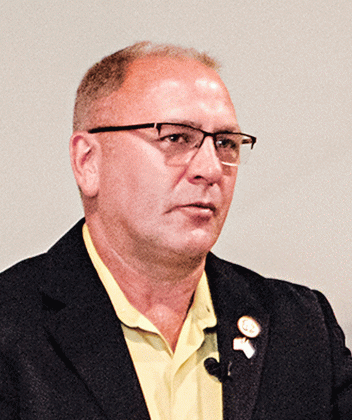
From the Franklin Banner-Tribune
U.S. Congressman for Louisiana’s 3rd District Clay Higgins, said Tuesday that he intends to be judged by his constituency on the merit of his voting record, and the nature of his faith and political affiliations.
All of which, he affirmed are unapologetically founded in Christian ideals and constitutional patriotism.
“Last year, when I came before you Rotarians, and I met a couple of you here in this crowd, I asked you to measure me as a potential candidate, as a congressman candidate,” Higgins reminisced. “Now I stand before you, nine months in office, and I ask you to measure me as your representative.”
Higgins was the guest at the weekly Franklin Rotary Club luncheon at the Forest Restaurant, where he spoke about his call to Federal Office and the significant role his and his family’s faith played in his seeking a congressional seat.
“I believe that our lives are reflective of our nation,” Higgins said, “and the struggles and challenges that we face as a nation, are reflective of the journey of each of us, as we learn and grow, and do our best to become the best people that we can, and the best Christians that we are capable of becoming.”
Higgins was born in New Orleans, the seventh of eight children.
When he was young, his father moved the family out of New Orleans, to a big house in St. Tammany Parish with a big barn, where the family raised and trained horses.
Higgins described his parents as “two powerful Americans” and his childhood as “wonderful.”
However, he noted that despite having been taught life lessons by his parents and the experiences of his young life, Higgins says he was stuck. “You know, the lessons that we learn during the course of our lives, sometimes we hear the lessons, but we don’t learn the lessons. Sometimes it takes many, many years of long trials and tribulations, and my life was no exception,” Higgins said.
Though he became very successful in his young adult life, both professionally and financially, he said that he was unfulfilled as a husband, father and as a person.
In 2002, he moved to Acadiana after living overseas for a while, and said that for the first time in his life, he felt at home.
In 2004, he became a police officer, admittedly in order to change his life from one of luxury, to one of austerity and service, to connect more completely with Christian principles.
He served in law enforcement in various forms after 2004, and when he resigned as a captain in 2016, he said it was to retain his principals to the detriment of his career.
Higgins said that following his resignation, he and his wife sequestered themselves in prayer, to confirm what next step his career path should afford. He said that when he returned, after a few days of rumination, he had received messages of support from a myriad of people reaching out to him and his family with encouragement, encouragement that he should run for federal office. So, he did, and he won.
Since arriving in Washington, D.C, Higgins’ office has authored 12 bills, passed four bills, cosponsored 62 bills and completed 406 constituent cases.
In reference to getting a bill passed to repeal the Affordable Care Act, and replace it, Higgins said, “Listen, this is crucial that the Senate pass some healthcare reform legislation. We just need them to pass virtually any bill.” Higgins says the House of Representatives has done their job by passing the American Healthcare Act back in May, and that now, with only 11 days remaining to sell the “Sessions and Cassidy healthcare plan” to 50 members of the Senate, Higgins has placed the responsibility squarely on the shoulders of the same body which voted down the AHA. But, Higgins also said that he has faith that with the current bill before the Senate made to work in concert with the AHA, Americans may finally see the relief from the ACA that they so sorely need.
When asked what, if any, advice he had for the law enforcement community in their facing attacks of violence across the nation, from the very communities they police, he said, “Well, wanton violence, and serious attacks on law enforcement started after Ferguson,” Higgins said, referring to the riots and civil unrest that took place in Missouri after Michael Brown was shot by police in 2014. “They had been existent prior, but after Ferguson, ‘hands up don’t shoot’ was heavily investigated by the Obama Department of Justice, and was found to be a false narrative; and yet, it is quite pervasive, the belief that that is what happened, and all the violence that has manifested, ruthless and wanton violence, cops in their patrol cars just get walked up to and shot, it rarely ever happened prior to Ferguson. Now, it has become quite a regular event, and I think it is the responsibility of us as a nation to recognize that this is intolerable behavior, and you have to draw a strong line against it.”
In a brief interview with the media after the presentation, he added, “They’re not going to catch me,” lifting back his jacket to reveal his concealed .45 caliber, holstered weapon.
Higgins closed by saying, “I carry two things on me at all times—my King James version (holy bible), and my .45, and God tells me which one to use.”
